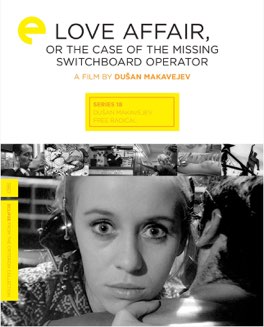DUŠAN MAKAVEJEV
Love Affair, or the Case of the Missing Switchboard Operator
I’m not really sure what to make of this film. Much like the last one I watched, I simply do not have enough cultural or historical context to know if I am “getting” everything the story is trying to tell me. That’s a somewhat omnipresent issue I run into while doing this project, but I suppose it’s sort of inevitable given its nature. I do what I can to try and learn the background, but there is only so much I’m going to be able to get.
Additionally, a movie with a lot of below the surface things going on is just not going to have the same effect on me as it would on the people and time it was designed for. At least what I did understand, I enjoyed, and for now that will likely have to be enough.
This film is structured in an unusual and interesting way. It’s a mixture of several lectures, on sexuality and criminality, with the tale of a love affair between two people.
The people, Izabela and Ahmed, spend most of the film with everything in their lives seemingly good. Right from the beginning though, we know that’s not actually the case. Similarly to Bergman’s To Joy, the audience is immediately told that things have worked out in a particularly unsavory manner. What we don’t know until the end is exactly how it happens, or why. This creates a sense of dread that hangs over the otherwise lovely story. That dread is even heavier than in the Bergman film, because it’s not a tragedy we’re waiting for, but an act of malice.
As with the Bergman, I like this as a technique. It contextualizes what we’re seeing and prepares us for the inevitable. Otherwise, especially in this film, the ending would be shocking in a less helpful way. As it stands, it creates an interest in what’s going on that might otherwise be absent.
I read on the Wikipedia entry for this film that all of this is just surface, and that the film is really a critique of the communist regime of its time. I have no idea if that’s true or not, but for my own part I struggle to see how that would fit with the film I watched. But that’s the whole point really, it might make perfect sense if I had grown up in post-war Yugoslavia.
